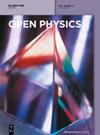Effect of the gravitational field strength on the rate of chemical reactions
IF 1.8
4区 物理与天体物理
Q2 PHYSICS, MULTIDISCIPLINARY
引用次数: 0
Abstract
The magnitude of the rate of chemical reactions also depends on the position in the gravitational field where a chemical reaction is being carried out. The rate of chemical reaction conducted at a stronger gravitational field,引力场强度对化学反应速率的影响
化学反应速率的大小还取决于进行化学反应的引力场的位置。如果重力场中两个位置的温度和压力保持不变,在重力场较强的位置(即靠近某个重行星表面的位置)进行的化学反应速率要比在重力场较弱的位置(即远离重型植物表面的位置)进行的反应速率慢。几乎所有类型的反应速率理论,即过渡态理论、碰撞理论、赖斯-拉姆佩尔格-卡塞尔-马库斯理论和马库斯理论的速率常数,都是用广义相对论的语言来表述的,由此可见重力对反应速率的影响。玻尔兹曼常数的引力变换和分子的能量量子级都是用量子力学发展起来的。还提出了热力学状态函数的引力变换,成功地解释了不同引力场下反应物和活化复合物之间的准平衡状态。引力质量扩张的提出,解释了在较弱的引力场下,过渡态拥有更多的动能在反应坐标上平移,导致反应物更快地转化为产物。半衰期方程的引力变换显示了化学反应半衰期的引力时间膨胀,从而使广义相对论和本理论相互吻合。
本文章由计算机程序翻译,如有差异,请以英文原文为准。
求助全文
约1分钟内获得全文
求助全文
来源期刊

Open Physics
PHYSICS, MULTIDISCIPLINARY-
CiteScore
3.20
自引率
5.30%
发文量
82
审稿时长
18 weeks
期刊介绍:
Open Physics is a peer-reviewed, open access, electronic journal devoted to the publication of fundamental research results in all fields of physics. The journal provides the readers with free, instant, and permanent access to all content worldwide; and the authors with extensive promotion of published articles, long-time preservation, language-correction services, no space constraints and immediate publication. Our standard policy requires each paper to be reviewed by at least two Referees and the peer-review process is single-blind.
 求助内容:
求助内容: 应助结果提醒方式:
应助结果提醒方式:


